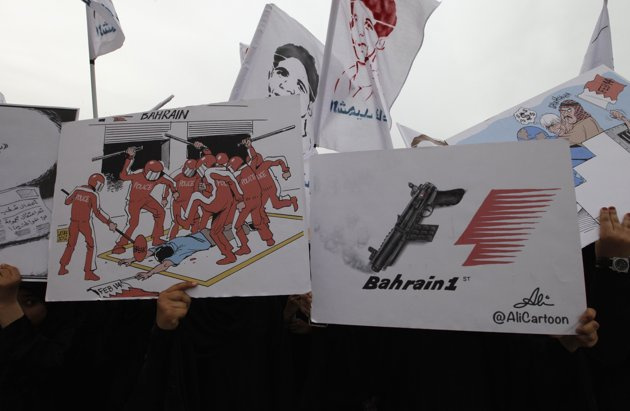Will the Grand Prix race be held in a bloodbath?
A Formula to Break Al-Khalifa

Mohammad Dehghan: Developments in Bahrain are related to their one year protest movement which is now intensified because of the Formula 1 car race which is to be held in this country. The reason is that the government of Bahrain has ignored the demands of the people and has not offered a proper solution to solve this crisis; the protests are a movement which will gradually move towards revolution, for people’s demands in the first stages have been reforms within the framework of the constitution for which they have voted. But the government has not taken the necessary steps for its enforcement, especially with regard to representatives of the parliament and giving credit to people’s votes. And now these contradictions have caused problems for this regime. If the government of Bahrain had considered reforms and acted seriously in this regard, perhaps these developments would not have happened. But it feels that, considering the events in the Middle East, it has to prolong this issue to buy time. Even people who demanded deep reforms within the system lost their jobs. Other steps were also taken, such as the report of Bassiouni, the UN’s Arab advisor, in which the existence of torture in prisons and the non-affiliation of the protesters and opposition to other countries-- meaning Iran-- were declared. But the government of Bahrain did not even pay attention to this report which was published in official sources.
The government of Bahrain delays this issue and does not seriously execute any reform measures. Some of the political analysts of this country pretend to take reformist steps and are awaiting great changes and even a war to occur in the Middle East. Since they cannot understand what the votes of the majority mean, they do not take any steps to satisfy them.
Last year, the Formula One Grand Prix car race was cancelled, but unfortunately this year, due to economic reasons, the government of Bahrain has decided to hold this race. The people of Bahrain believe that there are political objectives behind these sports competitions and that is to show to the world that the political atmosphere in Bahrain is calm and secure.
The second reason the movement in Bahrain has been prevented from reaching a desirable outcome is the plot that is forming in the region, which is to introduce this movement as a Shiite movement. Through this method, they have placed the Sunnis and others who have gathered within the framework of parties in front of the people of Bahrain.
In general, considering people’s resistance in Bahrain and gradual pressures by Westerns countries on its government, and also the fact that the freedoms demanded by the Bahrainis are not only for the Shiites but rather for all the people of this country, despite their different sects, we may witness more developments in the future in Bahrain.
ID: Considering recent developments, how fragile is security in Bahrain?
MD: We have to accept that the people of Bahrain who are Sunni do not agree with this protest movement. By prolonging the suppression, the government has been able to sow discord between the Sunnis and the Shiites, like the government of Syria which has created gaps between its people, mainly among the Sunnis and the Alawis, through the prolongation of protests. But there is a difference; in Syria, the protesters were the Sunnis and in Bahrain they are Shiites. Although both protest movements demand democracy and freedom, the governments have been able to delay them by prolonging the matter.
In Bahrain, the government has tried to establish calm in Manama, its capital. And since the Sunni regions of the country are rather calm, it seems that the government has been able to restore calm throughout the country. The other difference between the situation in Bahrain and Syria is the number of killings. Although the population in Bahrain is much less than in Syria, the number of people killed in Bahrain is 40 to 50, whereas in Syria it is 10,000 to 15,000. Therefore, the government of Bahrain has used this difference to its benefit.
It seems that, considering the fact that the people of Bahrain demanded reforms in the beginning which were not met, they now employ more radical slogans which in turn have caused even parties like the Vefagh Party, which participates in the government, to take more radical measures.
ID: How are relations between the government and the opposition in Bahrain? Are they moving towards a resolution of the crisis?
MD: Relations between the government and the opposition in the early stages were such that the opposition were interested in dialogue and did not sanction the regime. Their strongest protest was against the prime minister and it was said that Bahrain’s Crown Prince himself had stronger tendencies towards reform. However, with the passing of time and the failure of negotiations and the disregard of human rights reports, the symbolization of two figures who had gone on hunger strike even though they had foreign passports, the request of Ban-Ki Moon, the UN Secretary General, and other countries such as the US and Europeans for the release of these prisoners; all of these issues have put pressure on the Bahraini government. But the government is trying to divide the Bahraini people and pit them against each other.
It seems that the Bahraini opposition is moving towards radicalism and it is even possible that they will take steps towards denouncing the monarchy itself, even though no such thing had happened in the past. The opposition has not clearly demanded the removal of the monarchy, but this demand has been mentioned mostly in slogans and during demonstrations. It is possible that just as some members of the National Parliament were present and then resigned, the resignations and the lack of reforms might lead to the demand for the creation of a republic in Bahrain.

